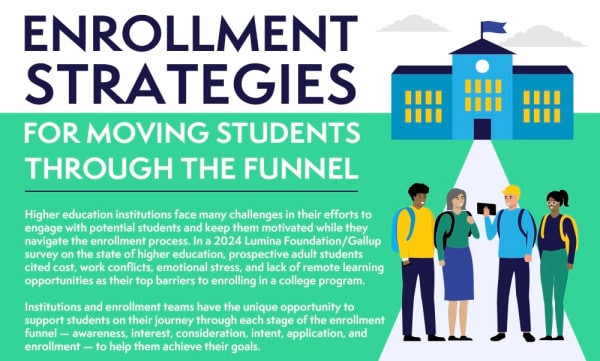Quality SEO Must Go Deeper Than Keyword Rankings
Think of a piece of content you’ve engaged with lately, whether it’s a book, movie, or news article.
Got one?
Regardless of the medium, that piece of content probably popped into your mind because it resonated with you on a human, personal level.
Your university’s content — including its blog posts, infographics, and videos — should resonate emotionally with prospective students in a similar way. That way, whenever they think of higher education, they think of you.
Your content team should position empathy — a deep, intuitive understanding of students’ needs and feelings — as a core component of your search engine optimization (SEO) strategy. That means you need to craft content that is not only informative and keyword-rich but also genuinely helpful and easy to digest. In this article, we’ll delve into how you can harness empathy to write SEO content that is both meaningful and functional.
Empathy in SEO Content Writing
Today’s search engines are smart. Not only are they adept at discerning the quality of content, they’re also able to respond to the intent and emotion behind users’ searches — particularly in sectors like higher education.
Empathy is fundamental in content creation. It serves as the bridge that connects your content to the hearts and minds of your audience, which requires understanding and addressing their true needs, thereby enhancing both their satisfaction and your SEO performance.
Understanding Search Queries
To craft SEO content with empathy, you need to understand the different types of search queries. Each of these types of queries, broadly categorized as navigational, informational, and transactional, reveals distinct aspects of the intent and needs of the person writing the query.
- Navigational queries indicate a desire to reach a specific website or page.
- Informational queries reflect a quest for knowledge or information without an immediate intent to purchase.
- Transactional queries signal a readiness to complete a transaction or engage in an activity.
By identifying the type of query they are responding to, your institution’s SEO content writers can tailor their content to meet the specific expectations and emotional state of their readers, thereby enhancing both the content’s relevance and the level of engagement it invites.
Analyzing Search Queries
When analyzing search queries, content creators can look for patterns and common themes in what prospective students are searching for within a particular niche. By using a tool like Google Analytics or SEMrush, they can see not only the frequency of certain queries but also the context in which these queries are made. This data allows for a more nuanced understanding of an audience’s needs and the specific type of information they are seeking.
For instance, consider a prospective student searching for “how to pay for college in California.” This is an informational query where the prospect is likely looking for a detailed guide or a step-by-step process. By recognizing this, an SEO content writer can craft a comprehensive article that not only explains the different types of student loans and financial aid available in California but also provides a clear, easy-to-follow application process. The content might include sections on eligibility requirements, documents needed, and tips for successful approval, all laid out in an empathetic tone that reassures and guides the reader through what can be a stressful process.
Moreover, by addressing the emotional component of the query — such as the anxiety about getting approved for a loan or the stress of navigating financial decisions — the content becomes more resonant and helpful, effectively meeting the audience’s deeper needs.
Decoding Search Intent
Uncovering the underlying purpose behind a prospective student’s search query — known as search intent — is crucial for a successful content strategy.
What Is Search Intent?
Search intent encapsulates the reason a user turns to a search engine. It ranges from seeking specific information or particular websites (informational and navigational intent) to making a purchase or completing a form (transactional intent). Understanding these categories helps you craft content that prospective students find helpful and engaging, directly impacting how search engines assess and rank your content.
Identifying Search Intent
Identifying search intent involves carefully analyzing search queries using an analytical tool such as Google Analytics or Search Console. This analysis provides insight into the motivations driving prospects’ searches, whether they’re looking to learn, navigate, or buy. For example, if analytics reveals a high volume of queries for “best online MBA programs in New York,” the intent is likely informational but with a transactional underpinning.
A content strategy that addresses this intent could include detailed articles about the benefits of pursuing an MBA online, key considerations when choosing a program, and rankings of top online MBA programs. Providing this comprehensive, targeted information addresses both the educational aspects and the practical steps for enrollment, directly meeting the audience’s need for thorough, actionable content.
Exploring Searchers’ Motivations
Exploring prospective students’ motivations is about delving into the psychological drivers behind their search behaviors. When content creators understand what actually drives a prospect to initiate a search, they can develop more empathetic and impactful content strategies. This involves not just answering the immediate questions individuals have but also addressing their emotional and psychological needs, which enhances their engagement and satisfaction.
Psychology of Search Behavior
Emotional and cognitive factors often influence how and why people search for information. For instance, a prospective student might search for “stress management for the college application process” not just for practical tips but also for reassurance and support during a stressful period of life. Recognizing these underlying emotional drivers allows content creators to craft responses that are not only informative but also comforting and empowering.
Mapping Prospective Students’ Journeys
Mapping prospects’ journeys involves creating detailed personas and visualizing the steps they take from their initial search query through their engagement with your content. This process helps in understanding the various touchpoints where prospective students interact with your content and what they need at each stage.
This might include a journey from searching for “how to choose the right college” through reading various articles, visiting college websites, and finally engaging with interactive tools like virtual campus tours or financial aid calculators.
Practical Tips for SEO Content Writers
Here are some practical, actionable tips to help SEO content writers strike the right balance between relevance and empathy:
Structure Content to Match Prospects’ Needs
Your content should be structured in a way that exceeds prospective students’ expectations with thorough and compelling messaging. The following tactics can help you achieve this goal:
- Organize your content with clear, logical headings that guide the reader through each step of their query.
- Use emotionally engaging language that speaks directly to the reader’s concerns and aspirations.
- Incorporate storytelling elements where possible to make complex information more relatable and memorable.
Dive Deep into Searchers’ Psyches
To truly connect with your audience, begin with a comprehensive analysis of the searcher’s psyche. This means going beyond surface-level keywords to understand the underlying questions and emotional triggers that might not be explicitly stated. Tools like Answer the Public, Google’s People Also Ask feature, and analysis of searchers’ forums can provide insights into these deeper needs. Using these tools, you can create content that addresses both the stated and unstated questions, providing a richer, more satisfying experience for prospective students.
Answer Unasked Questions
Anticipating and answering questions your readers haven’t explicitly asked adds immense value to your content. For example, if you’re writing about “applying to law school,” you can include a section on “how to manage stress during law school applications” to address a common but often unspoken concern. This approach not only enriches the prospect’s experience but also increases the chance of your content being viewed as authoritative and comprehensive, which is favorable for SEO rankings.
Use SEO Best Practices
While empathy enhances your content’s relevance and audiences’ engagement, you need to balance this with solid SEO best practices:
- Keyword optimization: Integrate primary and related keywords naturally within the content, titles, and meta descriptions.
- User-friendly formatting: Use headings, subheadings, bullet points, and short paragraphs to make the content easy to scan.
- Backlinking: Include links to reputable, high-authority sites, as well as internal links to related topics on your own site.
- Mobile optimization: Ensure your content is optimized for mobile devices, since many readers access content on their smartphones.
Take Your SEO to the Next Level
Ready to enhance your SEO content with empathy and precision? Archer Education specializes in crafting engaging, effective content strategies that resonate with prospective students and drive results. We partner with numerous educational institutions to tackle their unique challenges through personalized content and advanced SEO techniques. Click here to contact us today!



